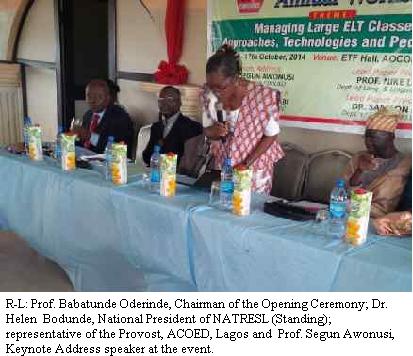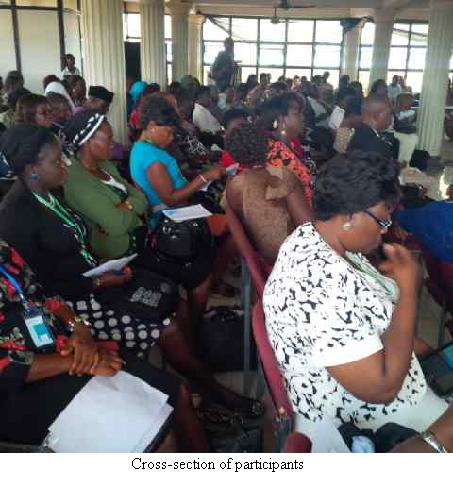A call has gone to educational authorities to ensure that more emphasis is placed in allocating adequate time to the teaching and learning of English Language, as this would enhance a better understanding of the language. This was part of the recommendations given in a communique, issued at the end of the 11th Annual Conference of National Association of Teachers and Researchers of English as a Second Language (NATRESL), held recently in Lagos. The conference themed, “Managing Large ELT Classes: Approaches, Technologies and Pedagogies”, was chaired and declared opened by Professor Babatunde Oderinde. According to Professor Oderinde, an expert in Curriculum Studies in English, the theme for the conference was very timely and relevant, noting that large classes were now common features in our educational system, unlike what obtained in the past. He enjoined participants to interact, share ideas, and contribute to solving the problem of managing large English Language Training (ELT) classes; both at the lower and upper educational levels in the country. Delivering the keynote address, a Professor of Language Studies, Segun Awonusi, situated the problem of managing large ELT classes in its global perspective. He opined that the notion of “large class”, as a learning-teaching environment was perception-based and noted that the challenges of inadequate infrastructure, instructional materials, lack of adequate feedback and administration of test instruments, could be overcome by adopting interactive strategies, active learning and other methods of reducing large classes for effective teaching and learning. 
Two Lead papers were presented at the conference. The first was by Professor Victoria Alabi, who specialises in Stylistics, when she suggested practical ways of overcoming the problems facing the teaching of Stylistics in schools, while the second Lead paper was delivered by Dr. Samson Dare, who emphasised the need to revive the reading culture among teachers and learners. Learners, he said, should be sensitised on the gains in imbibing reading culture, as it enlarged one’s mental capabilities in the course of reading different books and magazines on various disciplines. Reading, according to him, meant “dialoguing with books, which affords intercourse with the best minds of the world”.
The third day witnessed parallel sessions during which practitioners presented papers in line with the theme of the conference, where the unpleasant experience associated with large classes were well discussed and they came up with practical solutions through the use of humanistic method of teaching, motivation of learners, adoption of group method of teaching, use of multi-media and emerging technologies, collaborative and interactive teaching, relating learning activities to learners’ context, as well as the need for multiple representations through the use of role play activities and development of concept maps. Language researchers’ attention was also drawn to a recent trend in language, using the corpora (corpus linguistics). Though highly capital-intensive, interested researchers were encouraged to synergise and engage in proposal writing by reaching out to donor agencies for sponsorship, to enable them acquire the corpus linguistics. Workshop anchors for the teachers were Dr. Helen Bodunde, Head, 
Communication and General Studies Department, FUNAAB, Dr. Titi Fola-Adebayo of the Federal University of Technology, Akure and Dr. Alexandra Esimajethe Benson Idahosa University, Benin-City; the latter two being the Financial and General Secretaries respectively. Other recommendations in the communique, which was jointly signed by Dr. Helen Bodunde and Dr. Sinmisola Sotiloye, both Teaching English in Second Language (TESL) dons in FUNAAB and the National President and Chairman, Communique Drafting Committee ofrespectively, include the need to have more infrastructural facilities such as e-learning, e-testing, projectors and other multimedia; provision of facilities to encourage learners to imbibe better reading culture, motivation of qualified teachers through giving of awards to the best subject teachers at the district and local government areas, attending to the welfare of teachers, providing favourable workplace environment, good remuneration, sponsoring of more teachers for in-service training and exploring alternative power generation and supply in schools, as most multimedia-based instructional solutions are powered by electricity.
